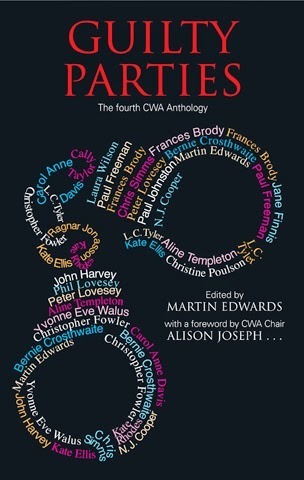Martin Edwards's Blog, page 203
April 16, 2014
Guilty Parties

I'm pleased to announce the publication this month by Severn House of the latest anthology of the Crime Writers' Association, Guilty Parties. I've been editing the CWA anthology since the mid-Nineties, and it's always a joy to receive so many original stories. The only downside is that not all of the stories I enjoy can be included, for reasons of space, and that was especially the case this year, when I was flooded with submissions that were very varied and entertaining.
The book contains an intro from me, a short foreword by Alison Joseph, chair of the CWA, and author bios, but the meat, of course, is in the stories themselves. Because several entries were very short, I did manage to find space for more stories than usual - 24 in all. And they are all brand new. My own entry, "A Glimpse of Hell", was inspired by the wonderful time I had last year on the small island of Grand Cayman in the Caribbean. Definitely one of the bonuses from my travels in recent years.
There are some very distinguished names on the contributor list. They include Peter Lovesey, doyen of classic detection, and also his son Phil, who is himself a splendid writer and past winner of the CWA Short Story Dagger. Laura Wilson, Aline Templeton and N.J. Cooper are there, and so too John Harvey - creator of Charlie Resnick- Christopher Fowler, and Paul Johnston. There are also writers from overseas, including Ragnar Jonasson.
Among the other contributors are Chrissie Poulson (whose thoughtful blog is always worth reading), Frances Brody, Kate Rhodes and Chris Simms. Different readers will have different preferences among the stories, and regular readers of CWA anthologies will note that a number of the contributors, including some relative newcomers to the genre, have never before featured in the anthology. In choosing stories, my criteria include variety, which I do think is an important aspect of a book like this. As far as I'm concerned, it's both a pleasure and a privilege to have had the chance to put Guilty Parties together.
Published on April 16, 2014 05:34
April 15, 2014
Ruskin, Research, and The Gateway to Paradise


John Ruskin must have been one of Victorian Britain's most fascinating men. An eccentric, perhaps, but blessed with many gifts. I enjoyed referencing his work in The Arsenic Labyrinth, and on Saturday, I saw for myself what he described as "the gateway to paradise" - the view from Muncaster Castle, just outside Ravenglass. Muncaster is a terrific place, and I was lucky enough to bump into and have a chat with the owner, Patrick-Gordon-Duff-Pennington, who at the age of 84 was quietly doing a bit of pruning far from the madding crowd (a crowd which on Saturday included a wedding party, the inhabitants of the owl sanctuary and more than a dozen herons, whose feeding time was a memorable free-for-all which attracted a couple of marauding buzzards.) Mr Pennington is a published poet, and I'm quite sure he finds his home surroundings inspirational.

Here are just a few of the herons. Muncaster is said to be one of Britain's most haunted castles, and though I'm not sure whether it fits in to my current storyline, it might prompt an idea for a ghost story or two. Not far away are several intriguing villages, ranging from Newbiggin, close to the M.O.D. firing range (warning notices tell visitors to beware of "strange objects" found on the beach - the mind boggles....) to Gosforth, with its ancient cross in the churchyard, and Eskdale Green, where I chanced upon a Japanese garden that the Forestry Commission is, thanks to volunteer work, reclaming more than sixty years after it was abandoned and became overgrown. A magical place, and very accessible.



Through talking to a number of people over the week-end, I felt I got a better handle on the way of life led in western Cumbria. I suppose many might ask whether all this research is necessary. Will it result in a better book, or is it really just an excuse for a trip to a lovely part of the world? Well, I am firmly of the view that, so far as possible, research for a book should be a pleasurable experience. While researching The Cipher Garden, for instance, I was kindly offered the chance to go sky-diving along with an expert in the field, but that wasn't my idea of fun, so I declined with thanks. There are definite limits to how far I'm wiling to go in the quest for authenticity! But I do think it helps to see the setting for one's book at the right time of year. I have set several scenes of the new story in Ravenglass and its vicinity in April, and I wanted to see the village at the right time of year.

Thanks in no small part to Neil of the Rosegarth Guest House, I got more out of the week-end than I'd bargained for, as he drew my attention to two particular locations not too far away which may well feature, not in the book I'm writing at present, but in a later Lake District Mystery. In the meantime, I came home having had plenty to savour and having gained insights which will, I hope, strengthen my work-in-progress. I'm certainly very motivated about the project,and feeling more optimistic about it than is often the case at the half-way stage of writing a novel. Time well spent in literary as well as feelgood terms, I like to think.
Published on April 15, 2014 02:32
April 14, 2014
Research - and returning to Ravenglass



I've just spent a marvellous week-end up in the Lakes, researching for my current work-in-progress. Back in the autumn, I wrote about my trip to reconnoitre the Ravenglass area before I started work, and now I'm about half-way through, I felt it was time to refresh my feel for the locations. There are good writers - Harry Keating and John Baker among them - who have written books set in places they've never visited, but I find it helps me to have a firm grasp of location. And the nature of the stories told in the Lake District Mysteries means that it is also, I think, a good plan to have an understanding of the way of life of various individuals who appear in the story. So I wanted to paint in some of the detail about the community in my own mind, and get an idea of what it is like to live in Ravenglass. Liz Gilbey, a regular contributor to CADS, had already given me some excellent information, along with photos, and I was looking to supplement these over the week-end.

One of my characters in the book stays in a B&B in the village, and I decided to do likewise - but to find somewhere rather nicer than the troubling place where she ends up. I fell on my feet with Rosegarth, a delightful little guest house commanding marvellous views of the estuary created by the three rivers. It's run by Neil, whose family members have just started running a tea shop on the ground floor. Both are strongly recommended, and Neil gave me a great deal of helpful information. I've written before about the way in which I've often benefited from people's knowledge when researching a book, and I took lots of notes when talking to Neil, as he has a great love of the locality. He travelled all over the world while with the Royal Navy, but there's nowhere he'd rather live than West Cumbria, and I find that very easy to understand. Ravenglass is rather remote from the busy world, and that, together with its Roman, Viking and medieval history, accounts for much of its appeal. An inspirational place in which to set a novel, and I'd love to stay longer and write there too. That's not really possible, but I gained a good deal from walking up and down Main Street and soaking up the feel of the village.

I also took a look at places like Eskmeals, Drigg and Seascale over the first part of the week-end, and was struck once again by the spooky juxtaposition of vast, lovely, empty beaches and the menacing presence in the distance of the Sellafield nuclear plant. There's a similar contrast to be found in one of my favourite books by P.D. James, set in Norfolk, Devices and Desires, but I think that West Cumbria is even more evocative, with the looming fells not far away in the background.


Meeting Neil led me to another encounter, this time with a very gifted local artist called Mark A. Pearce. I was lucky enough to be able to visit his studio, which has a fantastic position on the edge of the shore, and to find out more about the life of an artist - again very relevant to my story. Mark earned fame thirty years ago through acclaimed postage stamp designs, and spent many years in London amongst the glitterati before returning to West Cumbria. He paints superbly well, but he is also a graphic designer by background, and his prints are hugely impressive. I came across them in several locations over the course of the week-end and one day I'd like to acquire one of his works, as he really has a gift for capturing mood and colour.
And there's no shortage of mood and colour in Ravenglass. It's the home of La'al Ratty, a great little railway that attracts many enthusisasts, and Friday and Saturday evening saw me lured to the Ratty Arms, a pub converted from railway station buildings. Once again, recommended. And so, above all, are the Ravenglass sunsets. As good as anything I saw on my recent cruise in the Caribbean...


Published on April 14, 2014 02:19
April 11, 2014
The Riddle of the Sands and the birth of the spy novel
The Riddle of the Sands is a classic novel of 1903 by Erskine Childers which is widely regarded as one of the first notable spy novels. I saw the 1979 film version a long time ago, but despite a starry cast, including Michael York and the always watchable Jenny Agutter, it found it a bit flat. Perhaps partly because of that, it has taken me a long time to get round to reading the novel itself, but I recently read the Atlatntic Books edition, which includes an excellent afterword by Professor Robert Giddings.
Briefly, the story is narrated by a rather irritating civil servant called Carruthers, who is invited by an old university friend, Davies, to join him on a yachting trip. Carruthers' behaviour and attitudes in the early pages are boorish, although he recognises this later, and develops into a more likeable character. The relationship between him and the eager, obsessive Davies, is one of the strengths of the book. As they sail around the Frisian Islands, they have to figure out whether a mysterious man called Dollmann is all that he seems.
This is an important book for two reasons. First, in the short term, it drew people's attention to the threat to international peace posed by the Kaiser's Germany. Second, it set a standard for the spy story, and paved the way for the work of the likes of Eric Ambler and, much later, John Le Carre. Ambler and Le Carre, like Childers, were men who were prepared to question the status quo, but the story of how in real life, Childers eventually finished up paying the ultimate price for his attitudes is fascinating as well as upsetting.
There is a huge amount about sailing in this story, and - despite my admiration for the book - I felt this was a mistake. At one point Carruthers says of a train journey "the pace was execrable" and to be brutally honest, by that point. I felt much the same about The Riddle of the Sands. I suppose this is because endless details about how to sail a boat don't really interest me, yet Childers went overboard on them (sorry, couldn't resist that!)
Not a perfect novel, then, and I don't think Childers really was a committed novelist. He was more interested in ideas and actions and politics, and he was evidently as brave, stubborn and obsessive as Davies. But there's no doubt that he made a lasting contribution to espionage fiction. Giddings says the book has never been out of print, so I have not called it a Forgotten Book. And despite my reservations, it certainly does deserve to continue to be remembered.
Briefly, the story is narrated by a rather irritating civil servant called Carruthers, who is invited by an old university friend, Davies, to join him on a yachting trip. Carruthers' behaviour and attitudes in the early pages are boorish, although he recognises this later, and develops into a more likeable character. The relationship between him and the eager, obsessive Davies, is one of the strengths of the book. As they sail around the Frisian Islands, they have to figure out whether a mysterious man called Dollmann is all that he seems.
This is an important book for two reasons. First, in the short term, it drew people's attention to the threat to international peace posed by the Kaiser's Germany. Second, it set a standard for the spy story, and paved the way for the work of the likes of Eric Ambler and, much later, John Le Carre. Ambler and Le Carre, like Childers, were men who were prepared to question the status quo, but the story of how in real life, Childers eventually finished up paying the ultimate price for his attitudes is fascinating as well as upsetting.
There is a huge amount about sailing in this story, and - despite my admiration for the book - I felt this was a mistake. At one point Carruthers says of a train journey "the pace was execrable" and to be brutally honest, by that point. I felt much the same about The Riddle of the Sands. I suppose this is because endless details about how to sail a boat don't really interest me, yet Childers went overboard on them (sorry, couldn't resist that!)
Not a perfect novel, then, and I don't think Childers really was a committed novelist. He was more interested in ideas and actions and politics, and he was evidently as brave, stubborn and obsessive as Davies. But there's no doubt that he made a lasting contribution to espionage fiction. Giddings says the book has never been out of print, so I have not called it a Forgotten Book. And despite my reservations, it certainly does deserve to continue to be remembered.
Published on April 11, 2014 08:05
April 10, 2014
The New Case-Book of Sherlock Holmes - publication day!

A sentimental tobacconist. An eccentric testatrix. A musical butler. A suicidal lawyer. An absent-minded landlady. A persecuted accountant.
Question - What do all these extraordinary characters have in common?
Answer - they all take leading roles in stories included in The New Case-Book of Sherlock Holmes, my colleciton of Holmesian pastiches, which is available on Amazon as an ebook as from today. As well as the stories, there are a variety of extras, and I'm especially pleased that these include a lovely intro from that great guru concerning all things Sherlockian, David Stuart Davies.
You can "look inside" the book on Amazon to read the first few pages. Among other things, David was kind enough to say: "Martin Edwards has not only caught the style and quality of the originals, but the characters speak with Doylean voices. In short, Martin Edwards knows his Holmes and he puts that knowledge to great effect in this set of cases...It is interesting to note that while some of Conan Doyle’s stories have weak plots – ‘The Mazarin Stone’ and ‘The Veiled Lodger for example - all the tales presented here are finely constructed mysteries in which Holmes is able to demonstrate his brilliance as a detective."
I'm really gratified by these comments, especially as no brown envelope stuffed with cash passed between me and David (though next time we meet up in a bar, I'll be glad to buy him a pint or two!) Until now, almost all of these stories have been very difficult for readers to find. Now that they are readily obtainable (and, I'm tempted to add, for a bargain price...) I hope that Sherlock fans will take the same view as David. Fingers crossed!
Published on April 10, 2014 02:00
April 9, 2014
The Spice of Life

The fascination of islands is, for me, endless .The final port of call on my recent trip to the Caribbean, before returning to Barbados, was Grenada, the Spice Island, and it proved to be rich in natural beauty as well as vibrant in culture, with warm, friendly people. Every island has its distinct personality, shaped in part by the climate, and Grenada (unlike, say, Aruba, which has an arid, desert-type climate) is rich in flora and fauna, but also vulnerable to hurricanes. Among the places I visited was the lake in a volcanic crater,close to the nature reserve which is home to some very affable monkeys.


I haven't been able to track down any Grenada-based crime stories. T.S. Stribling's Poggioli, who I have mentioned in my last two posts, detected crimes in Barbados, Martinique and Hait as well as Curacao, but his later cases were set in the US. But there is certainly an appetite for Caribbean crime, if the popular success of Death in Paradise (set on a fictional island, but filmed in Guadeloupe) is anything to go by. Will some author be encouraged to write a new series, in which a detective moves from one Caribbean island to another, solving mysteries as he or she goes? I wouldn't be surprised. After all, what a wonderful part of the world to "have" to visit to research!




And the sheer variety of islands was brought home to me again last night, when I watched the first part of the new Shetland story, based on Blue Lightning, and set on Fair Isle. Very different in mood and temperature from Grenada, of course, yet in its way equally appealing. Visiting some of the Scottish islands (I've been to Mull and Skye but that's about it) is high on my to-do list. In the meantime, my trip to the Caribbean has provided a host of happy memories.

Published on April 09, 2014 04:17
April 8, 2014
Crime and Curacao (and Aruba)


Curacao, which I visited last week, is an island that I associate with its famous liqueurs, some of which I managed to sample whilst I was there,but it was also the setting for a landmark crime story. "The Refugees" was the very first of T.S.Stribling's stories to feature his detective Poggioli, and opens with the rather nice line: "Deposed presidents flying out of Venezuela are a fairly ordinary phenomenon in the West Indies." This is a reminder that the islands I visited, which were collectively known as the Netherlands Antilles but are now self-governing to varying degrees, lie only a short distance from the Venezuelan coast. This is as close as I've ever come to South America. Maybe I'll get to that continent one day...




In the meantime, I was really taken with Curacao, and it's somewhere I'd be very glad to visit again. There are plenty of fascinating sights, ranging from the Hato Caves,with the mysterious faces that one can discern in the rock formations, to the markets by the waterfront, and an excellent maritime museum tracing the island's intriguing history. Given that I knew so little about this part of the world before my trip, I found it a sobering reminder that there are simply too many wonderful places to visit to fit into a single lifetime. Just as there are too many wonderful books.
If, however, you would like to fit in a book featuring Poggioli, I can recommend Stribling's Dr.Poggioli, Criminologist, with a very good intro by Arthur Vidro, which ten years ago was an entry in Crippen & Landru's excellent series of lost classics. Arthur really does know his stuff. The book includes nine stories, as well as a complete Poggioli bibliography. Sadly, I don't think any other detective stories by Stribling were set on Curacao. I wonder if any other crime fiction has been set there more recently?










Aruba, not too far away, is another fascinating place, though I haven't so far been able to trace any crime fiction connection. I went on a tour which ranks as one of the best I've ever enjoyed, and which included a walk round a disused gold mine, a climb up the Casibari Rocks, and a visit to the Natural Bridge. The absolute highlight, though, was a trip on a semi-submersible to take a look at the wreck of the German ship Antilla, scuttled by its crew after the Second World War began. I've never done anything like this before, and simply loved the experience.
These are great places to relax, but again I found myself unable to resist mulling over ideas about a crime story set on one of the islands. They have a distinct personality, both individually and collectively, and their history and Dutch heritage is very much part of the appeal. Some people have told me that Caribbean islands tend to be rather "samey", especially if you want to do more than just lie on a beach, but that isn't the case with these particular islands. I found them quite inspirational.


Published on April 08, 2014 08:54
April 7, 2014
Back from Bonaire

I've just returned from a part of the world where, as this sign in a cafe in Aruba shows, internet access can be hard to come by. Lured away once again by Thomson Cruises, I've spent a week in the Eastern Caribbean, and it really was a fantastic experience. After my recent trip to the Arctic, I felt in need of some serious sunshiine, and the islands visited by the Thomson Dream did not disappoint. I must admit I'd barely even heard of some of the destinations, but Bonaire, for instance, was a wonderful discovery.






Bonaire bears little resemblance, it must be said, to my home town of Northwich, but what they have in common is a tradition of salt-making and to my amazement the chap in the museum with whom I talked about salt-making had actually heard of Northwich. But even I would admit that Bonaire has the edge in terms of climate and scenery.
I didn't get quite as much reading done as on my Arctic trip, but I did enjoy one debut novel and three Forgotten Books, of which more in due course. For once, I didn't take any stories set in my destination, and I've read only a handful of stories set in the Caribbean. These include some of the classic Professor Poggioli short stories by T.S. Stribling, such as "Cricket", set in the ship's main base, Barbados. For me the highlight of visiting Barbados was definitely Harrison's Caves, perhaps the most dramatic underground tourist attraction I've ever visited.


And only about thirty-six hours before I write this post (having semi-recovered from jetlag thanks to a good sleep post-flight) a pre-departure tour offered a last chance to enjoy the sun, with all the luggage packed. Hugely enjoyable. And having the chance to relax did give me time to think, very actively, about future writing projects.

Published on April 07, 2014 14:39
April 4, 2014
Forgotten Book - Rose's Last Summer
Margaret Millar is not, thankfully, a forgotten author, but I think it's fair to say that Rose's Last Summer is not among her best-known books. In fact, I've had a copy for years, and never bothered to read it - possibly because the title didn't entice me. So I think this novel, first published in 1952, can definitely be regarded as a Forgotten Book - not least forgotten by myself. But I finally got round to reading it while in Norway, and I'm really glad I did. It's terrific.
Rose French is a faded actress who has worked her way through five husbands and all her money. She is now lodging with a rather unpleasant landlady, and has made a friend of a nice young man called Frank, who is a sort of social worker. When the news comes that she has been found dead in the grounds of a house belonging to a family with which she had no obvious connection, a puzzled detective seeks Frank's help in the task of finding out what became of Rose.
The story develops in an unusual way, but as usual with Millar there are excellent twists. These are not, perhaps, as difficult to anticipate as in her finest books, but they are still pretty good. For a long time, it's not clear that this is really a detective story, and is certainly not a conventional book, but it ticks the whodunit box as well as plenty of others.
What is so admirable about this book, though, is the quality of Millar's writing. Her descriptions of people and places are incisive, witty and original. Time and again I found myself admiring the way she can capture someone in a couple of precise phrases. Her literary gifts, as much as her skill at concocting excellent plots, help to explain why she is regarded as one of the finest female crime writers - perhaps the finest ever to come from Canada. I have been a Millar fan for many years, and can't quite believe how long it took me to read this very good novel.
Rose French is a faded actress who has worked her way through five husbands and all her money. She is now lodging with a rather unpleasant landlady, and has made a friend of a nice young man called Frank, who is a sort of social worker. When the news comes that she has been found dead in the grounds of a house belonging to a family with which she had no obvious connection, a puzzled detective seeks Frank's help in the task of finding out what became of Rose.
The story develops in an unusual way, but as usual with Millar there are excellent twists. These are not, perhaps, as difficult to anticipate as in her finest books, but they are still pretty good. For a long time, it's not clear that this is really a detective story, and is certainly not a conventional book, but it ticks the whodunit box as well as plenty of others.
What is so admirable about this book, though, is the quality of Millar's writing. Her descriptions of people and places are incisive, witty and original. Time and again I found myself admiring the way she can capture someone in a couple of precise phrases. Her literary gifts, as much as her skill at concocting excellent plots, help to explain why she is regarded as one of the finest female crime writers - perhaps the finest ever to come from Canada. I have been a Millar fan for many years, and can't quite believe how long it took me to read this very good novel.
Published on April 04, 2014 02:30
April 2, 2014
Twisted Nerve - film review
Twisted Nerve is a controversial film from 1968, a horror story about a psychopath in sub-Hitchcock vein. It combines a number of excellent ingredients with some questionable taste. It's almost always a mistake to judge films, or books, from the past by the standards of today, but even in 1968, I think there was something rather disturbing about this movie, not least in its rather dodgy (and, I think, unncessary to the plot) science about the nature of psychopathy and its relationship with disability. It's directed and co-written by Roy Boulting, but much, much darker than the Boulting Brothers' usual fare.
When I first saw this movie, as a student in the Seventies, I was startled to find that the lead character, played by Hywel Bennett, was an ex-Oxford man called Martin. To say that I didn't identify with him would be an under-statement. Not only was the young Hywel Bennett conspicuously handsome, he was playing a character who is seriously disturbed and very dangerous indeed.. A weird, baby-faced guy with an affluent but troubled family background, he becomes obsessed with a pretty young librarian (Hayley Mills) and concocts an elaborate scheme which involves him conning his way into the large house in which her mother (the superb Billie Whitelaw) takes paying guests, and contriving an alibi so as to stab his stepfather (Frank Finlay) to death.
The murder is investigated by a jaundiced cop played by Timothy West, while one of Martin's fellow lodgers is played by Barry Foster. By any standards, it's a terrific cast, and the Hitchcock connection is emphasised by the fact that Foster and Whitelaw appeared in the great man's late film, Frenzy - also about a sociopathic killer - as well by the haunting score, written by Hitchcock's favourite soundtrack composer, Bernard Herrmann.
Twisted Nerve is rather strange, not least because it is slow-moving with occasional bursts of lurid action. Yet it is undeniably chilling, in all sorts of ways. As for Hywel Bennett, his health problems have been well documented for a long time, but in his hey-day in the Sixties, he was not only very good-looking but also a very fine actor. It's sad that he wasn't able to maintain the brilliant standards of the first part of his career, but his best performances are genuinely striking..
When I first saw this movie, as a student in the Seventies, I was startled to find that the lead character, played by Hywel Bennett, was an ex-Oxford man called Martin. To say that I didn't identify with him would be an under-statement. Not only was the young Hywel Bennett conspicuously handsome, he was playing a character who is seriously disturbed and very dangerous indeed.. A weird, baby-faced guy with an affluent but troubled family background, he becomes obsessed with a pretty young librarian (Hayley Mills) and concocts an elaborate scheme which involves him conning his way into the large house in which her mother (the superb Billie Whitelaw) takes paying guests, and contriving an alibi so as to stab his stepfather (Frank Finlay) to death.
The murder is investigated by a jaundiced cop played by Timothy West, while one of Martin's fellow lodgers is played by Barry Foster. By any standards, it's a terrific cast, and the Hitchcock connection is emphasised by the fact that Foster and Whitelaw appeared in the great man's late film, Frenzy - also about a sociopathic killer - as well by the haunting score, written by Hitchcock's favourite soundtrack composer, Bernard Herrmann.
Twisted Nerve is rather strange, not least because it is slow-moving with occasional bursts of lurid action. Yet it is undeniably chilling, in all sorts of ways. As for Hywel Bennett, his health problems have been well documented for a long time, but in his hey-day in the Sixties, he was not only very good-looking but also a very fine actor. It's sad that he wasn't able to maintain the brilliant standards of the first part of his career, but his best performances are genuinely striking..
Published on April 02, 2014 02:00



